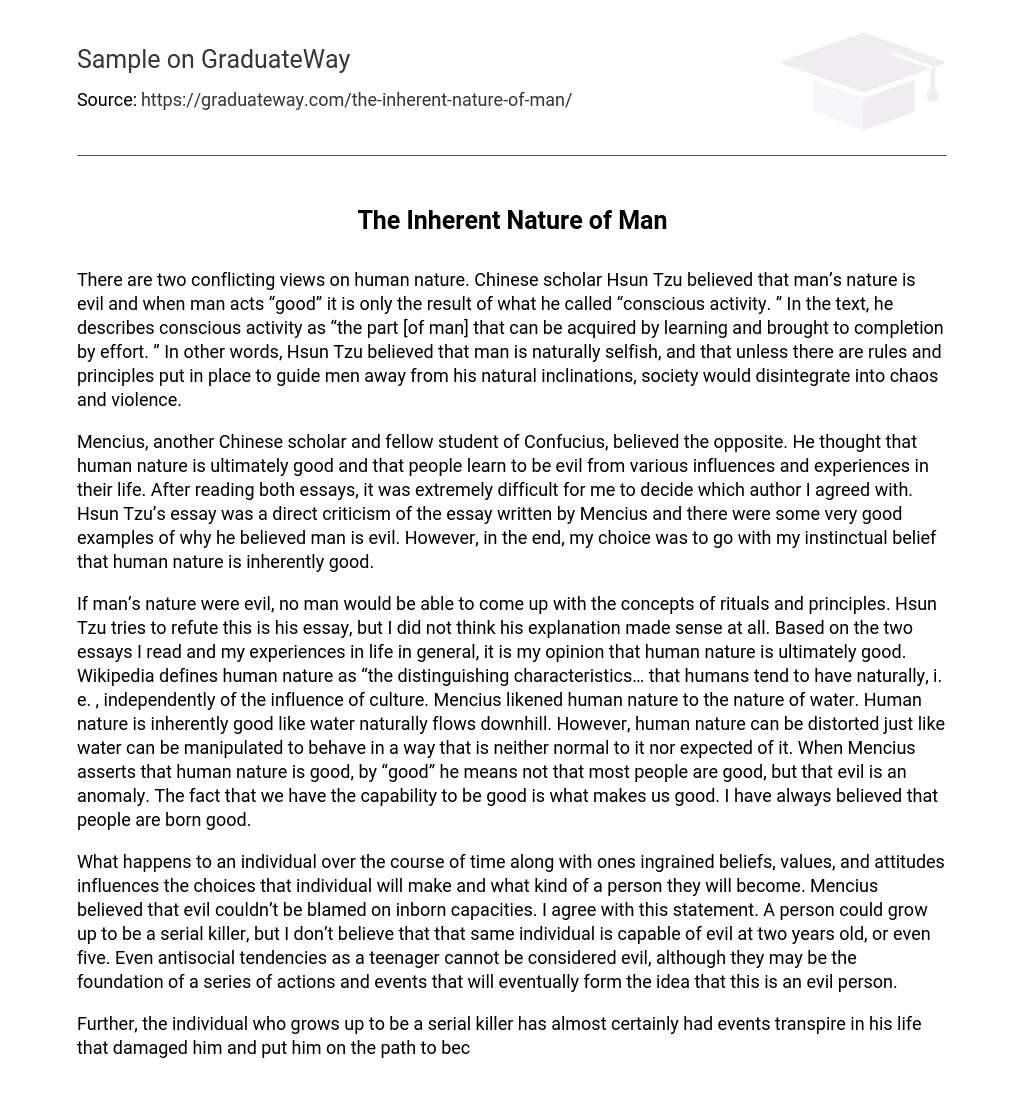According to Chinese scholar Hsun Tzu, there are two conflicting views on human nature. Hsun Tzu believed that man’s nature is inherently evil and that any “good” actions are only the result of what he calls “conscious activity.” Hsun Tzu defines conscious activity as “the part [of man] that can be acquired by learning and brought to completion by effort.” In other words, Hsun Tzu argues that man is naturally selfish and that without rules and principles to steer individuals away from their natural inclinations, society would descend into chaos and violence.
Mencius, a Chinese scholar and fellow student of Confucius, held a contrasting viewpoint. According to him, human nature is essentially good, and individuals acquire evil tendencies from their interactions and experiences. Evaluating both essays, I found it challenging to determine which author I agreed with. Hsun Tzu’s essay skillfully criticized Mencius’s essay, offering compelling evidence for the inherent evil of mankind. However, ultimately, I chose to follow my instinctual belief that human nature is fundamentally good.
If man’s nature were evil, the concepts of rituals and principles would not exist. Hsun Tzu attempts to argue against this in his essay, but I found his explanation illogical. Based on my reading of two essays and my life experiences, I believe that human nature is fundamentally good. According to Wikipedia, human nature is defined as the inherent characteristics that humans possess naturally, independent of cultural influence. Mencius compares human nature to water, suggesting that it is inherently good, much like water naturally flows downhill. However, human nature can be distorted, similar to how water can be manipulated to behave abnormally. When Mencius asserts that human nature is good, he means that evil is an anomaly rather than the norm. Our capacity for goodness is what defines us as good. Personally, I have always believed that people are born with inherent goodness.
While an individual’s experiences and personal beliefs shape their choices and personality over time, Mencius argued against attributing evil solely to innate capabilities. I concur with this viewpoint. It is unlikely for an individual to possess evil tendencies at a young age, such as two or five years old. Even during adolescence, antisocial behavior should not be labeled as evil, although it may serve as a building block for subsequent actions that eventually shape the perception of an individual as evil.
Moreover, the person who eventually becomes a serial killer most likely experienced certain incidents in their life that harmed them and led them towards becoming a serial killer, rather than pursuing a career as an accountant. The concept of benevolence versus righteousness was explored by Mencius. In an entry about Mencius on the Stanford Encyclopedia of Philosophy, it states that benevolence encompasses empathy and affection towards others. Mencius believed that benevolence is naturally present within human nature, and as human beings, we are unable to tolerate the sight of another human enduring pain.
According to Mencius, when a person witnesses a young child falling into a well, their innate reaction is to feel panic and anxiety, and to immediately attempt to rescue the child. This natural response is not driven by a desire for recognition or to improve one’s reputation, as Hsun Tzu suggests. Rather, it stems from the inherent nature of humans. Mencius believed that all individuals possess specific attributes that define the human experience, including benevolence, righteousness, ritual propriety, and wisdom.
All humans have innate feelings of compassion, contempt, beliefs about respect, and categorical standards for approval and disapproval. These innate feelings form the basis for the qualities of the human condition. While Mencius believed human nature was inherently good, he acknowledged the presence of evil. He argued that society could influence individuals in a way that fosters the development of evil. In his essay, Mencius mentioned malevolent rulers as examples and noted that there was a general perception of youth being violent and reckless.
According to Mencius, the actions of these young individuals can be attributed to their living conditions under a tyrannical ruler. A comparable situation occurred in Egypt last year when people expressed their discontent with their leader through riots and clashes with authorities. In my opinion, malevolence arises when unfavorable circumstances align with a weak character. It is fascinating how two individuals from the same background and similar life events can ultimately display different outcomes. This difference can be linked to the presence or absence of resilience.
When individuals overcome traumatic experiences and unfortunate circumstances, it often results in the development of strong character and the display of moral behavior. We can observe this in a woman who, despite being abused as a child, grows up to assist other victims of child abuse. Conversely, another woman who experienced childhood abuse may continue the cycle by abusing her own children. The existence of evil requires specific conditions to be met because it necessitates some kind of action. Without any action, evil cannot exist. Therefore, I believe that our human nature is predominantly characterized by goodness rather than evil.





